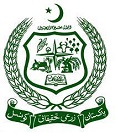PARC-KOPIA organized a Three-Day International Training Workshop on “Modern Breeding Technologies in Cattle” at ASI, NARC under KOPIA Technical Cooperation at Animal Reproduction & Genetics Program.

A three-day international training workshop on modern breeding technologies in cattle was organized at the Animal Reproduction & Genetics Program, ASI, National Agricultural Research Centre (NARC), Islamabad from March 26 to 28, 2024. This workshop was jointly organized by PARC and KOPIA (Korea Partnership for Innovation of Agriculture) under the patronage of Dr. Ghulam Muhammad Ali, Chairman of PARC, as part of the futuristic project entitled “Breed Improvement through Efficient Artificial Insemination Services by Using Korean Holstein Sexed Semen in Cattle”. The workshop aimed to advance the knowledge and train human resource in modern breeding technologies for cattle vis a- vis controlled breeding, artificial insemination, in vitro embryo production and transfer, DNA microarray, genome editing, and ex situ conservation. Participants of the workshop were from different R & D organizations, academia and livestock farm managers of Pakistan. The inaugural session of the workshop included opening remarks and an overview of the training workshop by Dr. Syed Murtaza Hassan Andrabi, Chief Scientist/Member Animal Sciences Division PARC. During this session an exhibition of livestock (cattle, buffalo, and goats) was also organized for the participants. The technical sessions of the three-day workshop featured lectures and practical sessions led by world-renowned Korean expert Dr. Sung Jong Oh, Director of KOPIA, Uzbekistan, and Dr. Syed Murtaza Hassan Andrabi. The sessions mainly focused on estrus synchronization, artificial insemination, in vitro fertilization, multiple ovulation and embryo transfer, DNA microarray technologies, ex situ conservation in cattle. On the third day, peri-urban cattle dairy farms in Islamabad were also visited. Participants gained hands-on experience and invaluable insights essential for cattle breeding programs in Pakistan. The workshop also included inter-active sessions among the participants and experts regarding genetic improvement of non-descriptive cattle in Pakistan. The way forward of this workshop emphasized the dire need to devise strategies to improve the genetics of non-descript cattle through short and long-term planning with the application of modern breeding technologies in particular artificial insemination and embryo transfer. The short-term strategy should involve crossbreeding non-descript cattle with exotic high-producing cattle, while the long-term strategy should be focused on the development of composite dairy cattle breeds.
